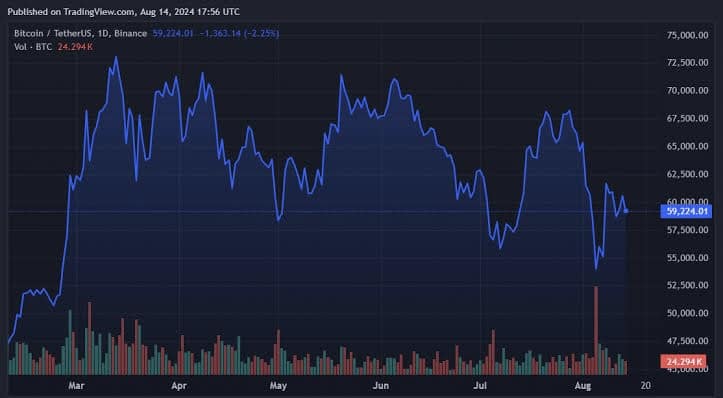On August 14, 2024, the U.S. government carried out a significant transaction by transferring approximately $594 million worth of Silk Road Bitcoin to Coinbase, one of the largest cryptocurrency exchanges. The move, first reported by Arkham Intel, involved the transfer of 10,000 Bitcoin from a government-controlled wallet known as “bc1ql” to Coinbase Prime, a platform favored by institutional investors. This action has sparked widespread discussion and speculation within both financial circles and the broader cryptocurrency community, underscoring the ongoing influence and legacy of Silk Road Bitcoin.

Silk Road Bitcoin Transfer: A Continual Impact on Bitcoin Markets
The transfer of these funds is the latest in a series of large-scale movements of Bitcoin that have been linked to the Silk Road, a dark web marketplace that was shuttered by the FBI in 2013. Silk Road was notorious for its role in facilitating illegal transactions, from drugs to weapons, using Bitcoin as the primary medium of exchange. Since its closure, the U.S. government has seized vast amounts of Bitcoin connected to the site, much of which remains in government custody.
This particular transaction is not an isolated incident. In late July 2024, U.S. authorities moved another significant amount—approximately $2 billion worth of Bitcoin, also tied to the Silk Road case—to an undisclosed location. These ongoing transfers have become a focal point for analysts and market participants who are keenly observing the U.S. government’s handling of these assets.
The news of the $594 million Bitcoin transfer had an immediate impact on the cryptocurrency market, contributing to a 3.6% drop in Bitcoin’s value. As reports of the transaction spread, Bitcoin’s price fell to around $59,100. Although the decline in value began before the transfer was completed, the news of such a large transaction exacerbated concerns among investors and traders. The market’s reaction reflects the sensitivity of Bitcoin’s price to large-scale movements of funds, especially those linked to government actions.

Source: Trading View
Market observers have suggested that the U.S. government might be strategically reducing its Bitcoin holdings in anticipation of potential market or political developments. The upcoming winter elections have added a layer of political intrigue to these transactions, with some speculating that the government may be attempting to manage its Bitcoin assets in a way that aligns with broader economic or political objectives.
The U.S. Government’s Bitcoin Holdings: A Powerful Position
Despite the recent transfers, the U.S. government remains the largest sovereign holder of Bitcoin, with an estimated $11 billion worth of the cryptocurrency still in its possession. This massive reserve positions the U.S. government as a significant player in the global cryptocurrency market. Decisions regarding the liquidation or retention of these assets are being closely monitored by market participants, as they could have far-reaching implications for Bitcoin’s future.

The government’s actions have not gone unnoticed in the political arena either. U.S. Senator Ted Cruz has recently emerged as a prominent advocate for Bitcoin, particularly in his home state of Texas. Speaking at the Texas Blockchain Council, Cruz described Bitcoin as a “reservoir of power” that could play a crucial role in bolstering the state’s energy grid systems. His comments have further fueled the ongoing debate about Bitcoin’s role in the future of American finance and energy policy, highlighting the intersection of cryptocurrency and politics.
The substantial transfer of Silk Road Bitcoin has introduced additional volatility into the already fluctuating cryptocurrency market. There is growing concern that the U.S. government may be preparing to offload more of its Bitcoin holdings through platforms like Coinbase, which could exert further downward pressure on Bitcoin prices. The market is also grappling with other sources of potential sell pressure, including the ongoing repayments to former customers of Mt. Gox, the once-prominent Bitcoin exchange that collapsed in 2014.
The movement of Silk Road Bitcoin by the U.S. government continues to be a significant event in the cryptocurrency world, influencing market dynamics, investor behavior, and price volatility. As the situation evolves, the global financial community will be closely watching to understand the full impact of these movements on the future of Bitcoin and the broader cryptocurrency market.
For continuous updates on the Silk Road Bitcoin and in-depth analysis on the latest developments in the cryptocurrency industry, stay tuned to TheBITJournal.





























